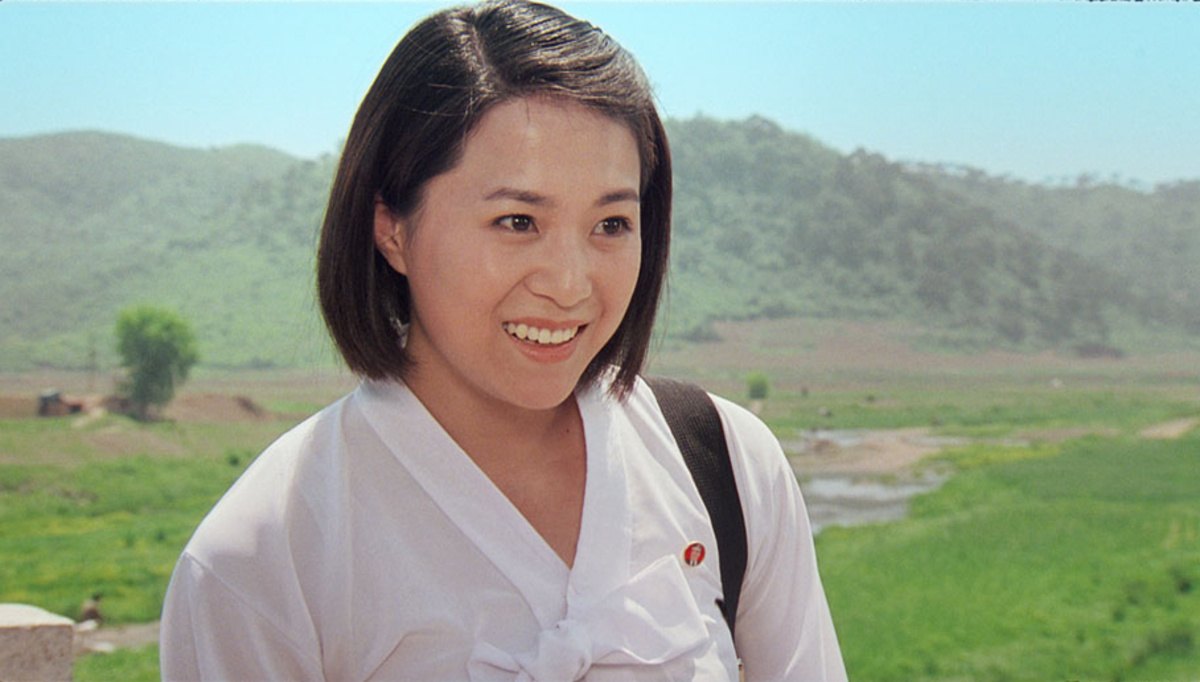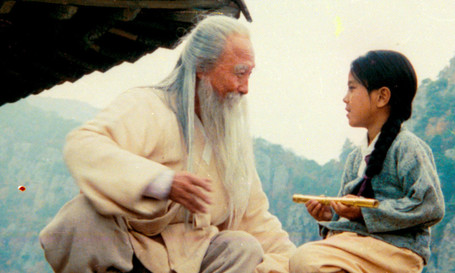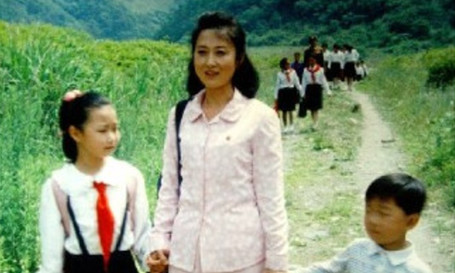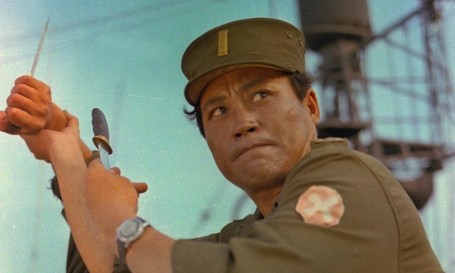Archiwum - 10. Festiwal Filmowy Pięć Smaków
Kino Korei Północnej
Kino Korei Północnej
Podczas 10. edycji widzowie będą mieć wyjątkową okazję by poznać sztandarowe dzieła z Korei Północnej, najbardziej enigmatycznej kinematografii azjatyckiej. Pokazy na Pięciu Smakach będę jedyną szansą, aby zobaczyć te fascynujące obrazy na dużym ekranie. W programie znalazły się dwie uznawane za sztandarowe dla północnokreańskiego przemysłu filmowego spektakularne produkcje z przełomowego roku 1986 oraz dwa filmy współczesne, ukazujące skrajnie różne oblicza realizowanych dziś obrazów. To świadectwo tego, jak bardzo uniwersalny jest język kina i jak skutecznie działają na emocje historie powstające nawet w tak trudnej rzeczywistości, a zarazem punkt wyjścia do dyskusji na temat roli kina w prowadzeniu polityki historycznej kraju.

 Towarzyszka Kim w przestworzach
Towarzyszka Kim w przestworzachNie są znane dokładne statystyki dotyczące północnokoreańskiego przemysłu kinowego. Wiadomo, że filmy realizuje się tam już od roku 1949, a ich treść była zawsze ściśle kontrolowana przez władzę, dla której X Muza stała się skutecznym narzędziem budowania wizji państwa pełnego blasku i szczęścia oraz przekazywania założeń doktryny Dżucze.
Najbardziej znaną historią związaną z kinem północnokoreańskim jest uprowadzenie w 1978 roku z Hongkongu reżysera Shin Sang-oka wraz z jego byłą żoną Choi Eun-hee, aktorką. Zadaniem niezwykle popularnego w latach 50. i 60. na Południu Shina było zbudować dla Kim Dzong-Ila przemysł filmowy z prawdziwego zdarzenia. Zakochany w kinie przywódca zapewnił w tym celu parze artystów bardzo komfortowe warunki pracy i intensywny program indoktrynacji. Plan się jednak nie powiódł, małżeństwo zdołało uciec podczas pobytu na festiwalu filmowym w Wiedniu w 1986 roku. Zanim to się jednak stało, reżyser zrealizował siedem filmów, z których najbardziej znanym jest "Pulgasari" z 1985 roku – odpowiedź na japońskie filmy o Godzili.
Mimo że obecność Shina w Pjongjangu zakończyła się dla przywódcy druzgoczącą klęską, miała ona kluczowy wpływ na dalsze losy kinematografii. Reżyser pokazał innym twórcom jak wielkie możliwości daje kino. Po roku '86 realizowane według jego wytycznych produkcyjnych filmy nabrały więc lekkości i widowiskowości, pojawił się w nich humor i motywy fantastyczne. Część zdjęć zaczęto realizować także poza granicami kraju. Jeszcze w latach 80. filmy północnokoreańskie dostępne były w wielu krajach demokracji ludowej, gdzie cieszyły się sporą popularnością - w jednym z numerów magazynu "Film" można przeczytać o tym, jak polscy fani aktora wcielającego się w tytułową rolę w "Hong Kil-dongu" gorączkowo domagali się od redaktorów informacji o nowym idolu. Upadek Związku Radzieckiego wpędził jednak kraj w drastyczne problemy finansowe, co odbiło się także na przemyśle filmowym, który od tego czasu funkcjonuje dość nieregularnie.
W latach "słonecznej polityki" (2000-2008), gdy Korea Południowa próbowała ocieplić relacje z sąsiadem, na Północy podjęto kilka prób stworzenia filmów, mających konkurować z zewnętrznymi produkcjami. Powstała wówczas północnokoreańska odpowiedź na "Titanica" - "Souls Protest" (2001), luźno oparty na historycznych wydarzeniach dramat o zatonięciu japońskiego statku Ukishima Maru, którym w 1945 Koreańczycy wracali z Japonii do ojczyzny. Powstawały też filmy obyczajowe, będące odpowiedzią na rosnącą popularność południowokoreańskich seriali - "Our Fragrance" z 2004 to historia o aranżowanym małżeństwie, "The Schoolgirl's Diary" z 2006 - o dorastającej dziewczynie. Według dostępnych informacji obecnie produkowanych jest kilka filmów rocznie: większość to jednak powrót do retoryki i sposobów realizacji sprzed czasów Shina. Niezwykle interesującym wyjątkiem jest "Towarzyszka Kim w przestworzach", powstała z inicjatywy dwójki zdeterminowanych twórców z Wielkiej Brytanii i Belgii, jednak zrealizowana w całości na północnokreańskich warunkach, z lokalną ekipą i współreżyserowana przez reżysera znanego z produkcji o tematyce militarnej. Emancypacyjna, pełna wdzięku historia młodej górniczki podbiła serca rodzimej publiczności - do tego stopnia, że niedawno ruszyła produkcja serialu ukazującego historię jej powstania.
W Pjongjangu organizowany jest co dwa lata międzynarodowy festiwal filmowy. W tym roku odbyła się jego 15. edycja. Choć dostęp do projekcji jest ograniczony i możliwy jedynie dla określonych grup społecznych, jest to dla widzów wyjatkowa okazja do zapoznania się z produkcjami z zewnątrz - do programu trafiają między innymi produkcje z Chin, Iranu, Indii, Rosji i Meksyku, ale też Niemiec czy Wielkiej Brytanii. W 2014 roku pokazany został między innymi hiszpański "Che Guevara" i polski "Mój rower" Piotra Trzaskalskiego, natomiast w 2016 wielkim przebojem okazał się południowoindyjski spektakularny epos historyczny "Bahubali". Festiwal, choć podlegający ograniczeniom, stwarza pewną przestrzeń do wymiany kulturowej - jak jednak wskazują relacje byłych mieszkańców Korei Północnej, nie jedyną. Władzom coraz ciężej utrzymać szczelność granic i wielu przeciętnych obywateli znajduje dostęp do zagranicznych produkcji, krążących na czarnym rynku i przemycanych z Chin i Korei Południowej.
Marcin Krasnowolski, Jagoda Murczyńska
Specjalnym gościem festiwalu będzie od lat pomieszkujący w Pjongjangu Nicholas Bonner, współreżyser filmu "Towarzyszka Kim w przestworzach", właściciel biura turystycznego Koryo Tours zajmującego się organizacją wyjazdów do Korei Północnej i wymianą kulturalną z lokalnymi instytucjami, biorący też udział w organizacji festiwalu filmowego w Pjongjangu.

Korea Północna 1986, 108’

Korea Północna 2013, 60’

Korea Północna 1986, 77’

Korea Północna, Belgia, Wielka Brytania 2012, 78’


